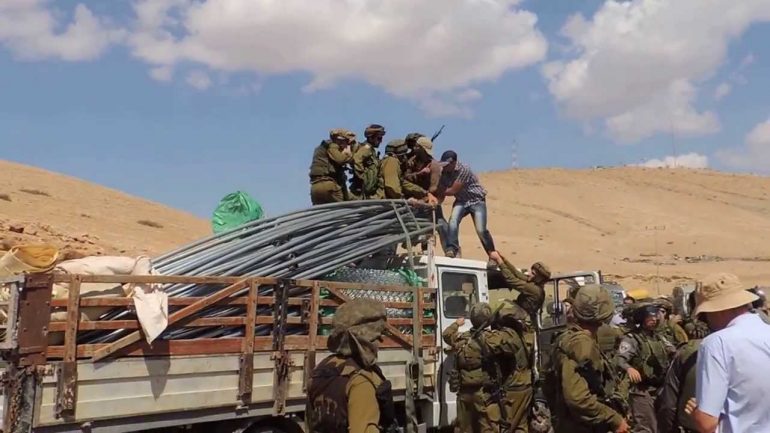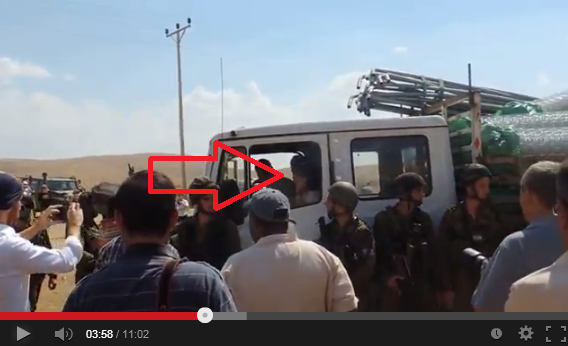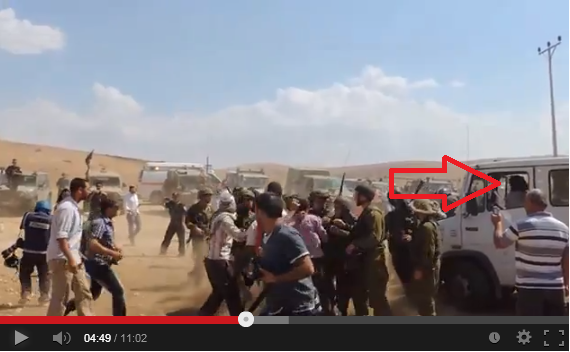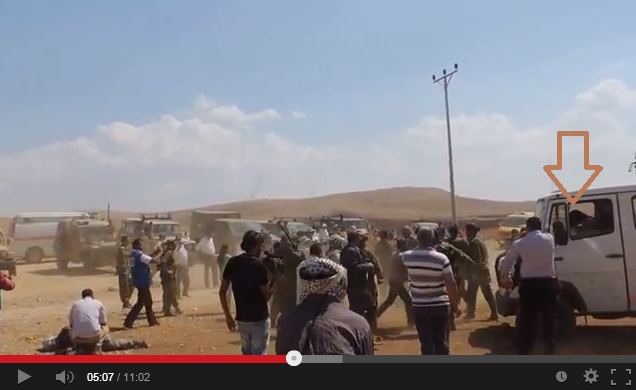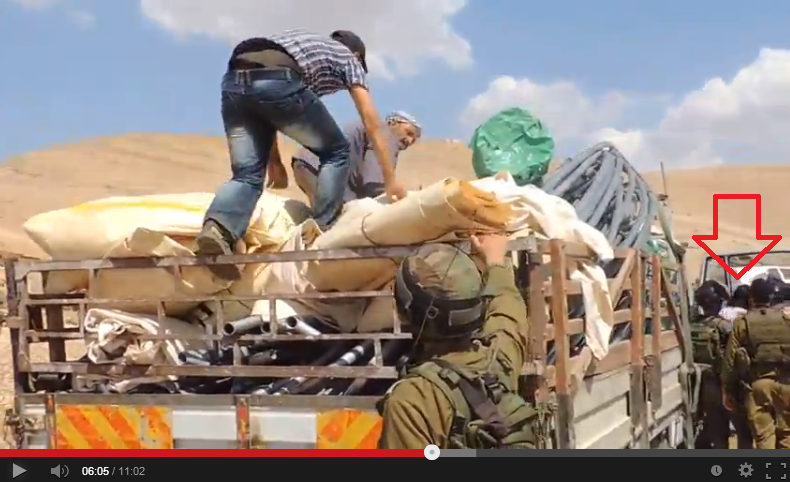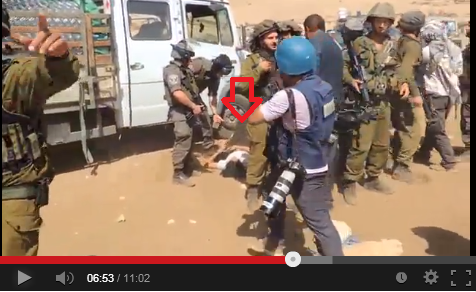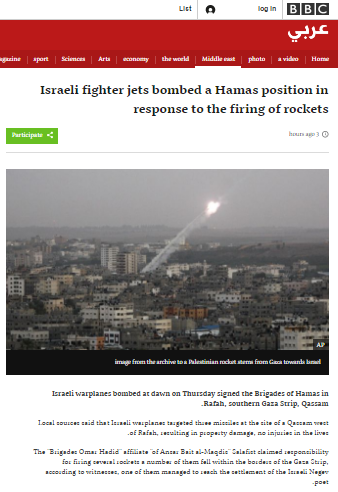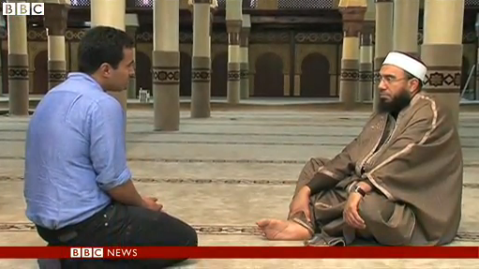On September 20th 2013 the Middle East page of the BBC News website carried an article titled “Diplomats protest over West Bank clash with Israel troops“.
The article, which has undergone some changes (though clearly not enough, as shown below) since its initial publication, relates to an incident which took place near Hemdat in the northern part of the Jordan Rift Valley (in area C, and hence – according to the Oslo agreements – under Israeli control) on Friday, September 20th.
On Monday September 16th buildings which had been constructed without planning permission at the Bedouin encampment of Khirbat Makhoul were demolished according to a ruling of the Israeli Supreme Court. The next day the International Red Cross arrived in the area and tried to set up tents, but removed them at the request of the authorities. On Friday a group of political activists and foreign diplomats arrived in the same place with the intention – in defiance of the court’s decision – of setting up more temporary structures described as ‘aid’. Soldiers removed the activists and the equipment they had brought in trucks from the site.
In the BBC’s account of the incident, the sole oblique reference to the fact that the activists were acting in defiance of a ruling by the Supreme Court comes in one short paragraph.
“The homes in Khirbet al-Makhul were knocked down on Monday after Israel’s High Court ruled that they had been built without the correct permits.”
That statement is followed by this paragraph:
“BBC Middle East correspondent Kevin Connolly, in Jerusalem, says the Bedouin villagers of Khirbet al-Makhul have refused to leave the land where they say they have grazed sheep for generations.”
Steering audiences towards a romantic vision of desert shepherds, Connolly makes no attempt to inform readers whether or not the villagers have any legal title to the said land or of the fact that, as is the case in all Western countries, land ownership – even if proved – does not mean that planning permission for the construction of a building is not required.
Much of the BBC report focuses on claims made by a French diplomat who was present at the incident – reportedly along with others from the EU, Britain, Spain, Ireland and Australia – despite the fact that internationally agreed diplomatic and consular conventions clearly state under the title of “Respect for the laws and regulations of the receiving state”:
“Without prejudice to their privileges and immunities, it is the duty of all persons enjoying such privileges and immunities to respect the laws and regulations of the receiving State. They also have a duty not to interfere in the internal affairs of that State.” (emphasis added)
Unfortunately, this is far from the first incident in which diplomats – including some from the UK FCO, which of course still provides the BBC with some of its funding – have displayed a marked lack of respect for such conventions – see here and here.
The BBC article also does not make it clear that members of the various diplomatic corps who took part in this orchestrated event did so in collaboration with politically motivated NGOs including Machsom Watch, ACTED (the Paris-based Agency for Technical Cooperation and Development) and EAPPI.
The caption to the photograph chosen to illustrate the BBC’s report on the incident states:
“French diplomat Marion Fesneau-Castaing said she was dragged from her vehicle”.
In the body of the report, readers are told that:
“One French diplomat said she was forced to the ground from her vehicle.”
And, quoting a Reuters article:
“French diplomat Marion Fesneau-Castaing told Reuters news agency: “They dragged me out of the truck and forced me to the ground with no regard for my diplomatic immunity.
“This is how international law is being respected here.” “
Interestingly, despite the fact that further information has become available since the publication of the BBC’s article, it has not been updated to inform readers of the fact that Ms Fesneau-Castaing’s allegations appear to be distinctly questionable.
In the video below, Fesneau-Castaing can be seen, together with two other people, at 03:58 sitting in the driving seat of the truck (on its left side) where she remains for a while, apparently talking on her phone. At 04:49 she can be seen moving of her own accord towards the truck’s passenger door on its right hand side and at 05:07 she can be seen sitting in the passenger seat. At 05:21 she can be seen opening the truck door on the passenger side and at 05:56 she is still sitting in the passenger seat, apparently speaking to soldiers outside the truck.
The crucial part of the sequence comes from 06:04 when the camera moves to the right hand side of the vehicle. At 06:05, Fesneau-Castaing can be seen lunging with her upper body out from the truck and one of the soldiers tries to catch her. The soldiers cannot be seen inserting their hands into the truck to drag her out of it, as claimed. At 06:07 Fesneau-Castaing can be seen with her legs still inside the vehicle, which of course causes her to fall to the ground. The soldiers try to pull her up to a standing position, but she is clearly using her body as a dead weight and so remains on the ground where she can still be seen at 06:53 as an Israeli soldier offers her a hand to help her up.
[youtube=http://www.youtube.com/watch?v=-vhf2b3yPmU&feature=youtu.be]
Ms Fesneau-Castaing’s dramatics did not stop there, however. Once on her feet again she was filmed (here at 0:54) hitting a member of the Israeli security forces in a very undiplomatic manner.
The BBC News website clearly needs to revise this article considerably if it is to comply with BBC editorial standards of accuracy and impartiality because, as it currently stands, it is nothing more than one-sided propaganda for a very blatant political campaign.
Related articles:
Visual Lies: Exposing the Truth Behind Demonstrations in Judea and Samaria
Video contradicts French diplomat claim she was roughed up by Israeli soldiers

